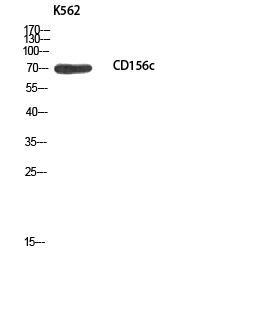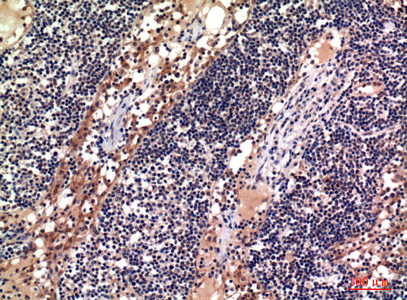CD156c Polyclonal Antibody
- Catalog No.:YT5686
- Applications:WB;IHC;IF;ELISA
- Reactivity:Human;Mouse;Rat
- Target:
- CD156c
- Fields:
- >>Alzheimer disease;>>Epithelial cell signaling in Helicobacter pylori infection
- Gene Name:
- ADAM10
- Protein Name:
- Disintegrin and metalloproteinase domain-containing protein 10
- Human Gene Id:
- 102
- Human Swiss Prot No:
- O14672
- Mouse Gene Id:
- 11487
- Mouse Swiss Prot No:
- O35598
- Rat Swiss Prot No:
- Q10743
- Immunogen:
- Synthesized peptide derived from the Internal region of human CD156c.
- Specificity:
- CD156c Polyclonal Antibody detects endogenous levels of CD156c protein.
- Formulation:
- Liquid in PBS containing 50% glycerol, 0.5% BSA and 0.02% sodium azide.
- Source:
- Polyclonal, Rabbit,IgG
- Dilution:
- WB 1:500 - 1:2000. IHC: 1:100-1:300. ELISA: 1:10000.. IF 1:50-200
- Purification:
- The antibody was affinity-purified from rabbit antiserum by affinity-chromatography using epitope-specific immunogen.
- Concentration:
- 1 mg/ml
- Storage Stability:
- -15°C to -25°C/1 year(Do not lower than -25°C)
- Other Name:
- ADAM10;KUZ;MADM;Disintegrin and metalloproteinase domain-containing protein 10;ADAM 10;CDw156;Kuzbanian protein homolog;Mammalian disintegrin-metalloprotease;CD156c
- Observed Band(KD):
- 70kD
- Background:
- ADAM metallopeptidase domain 10(ADAM10) Homo sapiens Members of the ADAM family are cell surface proteins with a unique structure possessing both potential adhesion and protease domains. This gene encodes and ADAM family member that cleaves many proteins including TNF-alpha and E-cadherin. Alternate splicing results in multiple transcript variants encoding different proteins that may undergo similar processing. [provided by RefSeq, Feb 2016],
- Function:
- catalytic activity:Endopeptidase of broad specificity.,cofactor:Binds 1 zinc ion.,domain:The conserved cysteine present in the cysteine-switch motif binds the catalytic zinc ion, thus inhibiting the enzyme. The dissociation of the cysteine from the zinc ion upon the activation-peptide release activates the enzyme.,function:Cleaves the membrane-bound precursor of TNF-alpha at '76-Ala-|-Val-77' to its mature soluble form. Responsible for the proteolytic release of several other cell-surface proteins, including heparin-binding epidermal growth-like factor, ephrin-A2 and for constitutive and regulated alpha-secretase cleavage of amyloid precursor protein (APP). Contributes to the normal cleavage of the cellular prion protein. Involved in the cleavage of the adhesion molecule L1 at the cell surface and in released membrane vesicles, suggesting a vesicle-based protease activity. Controls also
- Subcellular Location:
- Cell membrane ; Single-pass type I membrane protein . Golgi apparatus membrane ; Single-pass type I membrane protein . Cytoplasmic vesicle, clathrin-coated vesicle . Cell projection, axon . Cell projection, dendrite . Cell junction, adherens junction . Cytoplasm . Is localized in the plasma membrane but is also expressed in the Golgi apparatus and in clathrin-coated vesicles derived likely from the Golgi (PubMed:12475894). During long term depression, it is recruited to the cell membrane by DLG1 (PubMed:23676497). The immature form is mainly located near cytoplasmic fibrillar structures, while the mature form is predominantly located at zonula adherens and the cell membrane (PubMed:30463011). The localization and clustering of mature ADAM10 to zonula adherens is regulated by AFDN, TSPAN33,
- Expression:
- Expressed in the brain (at protein level) (PubMed:23676497). Expressed in spleen, lymph node, thymus, peripheral blood leukocyte, bone marrow, cartilage, chondrocytes and fetal liver (PubMed:11511685, PubMed:9016778).
- June 19-2018
- WESTERN IMMUNOBLOTTING PROTOCOL
- June 19-2018
- IMMUNOHISTOCHEMISTRY-PARAFFIN PROTOCOL
- June 19-2018
- IMMUNOFLUORESCENCE PROTOCOL
- September 08-2020
- FLOW-CYTOMEYRT-PROTOCOL
- May 20-2022
- Cell-Based ELISA│解您多样本WB检测之困扰
- July 13-2018
- CELL-BASED-ELISA-PROTOCOL-FOR-ACETYL-PROTEIN
- July 13-2018
- CELL-BASED-ELISA-PROTOCOL-FOR-PHOSPHO-PROTEIN
- July 13-2018
- Antibody-FAQs
- Products Images

- Western blot analysis of K562 using CD156c antibody. Secondary antibody(catalog#:RS0002) was diluted at 1:20000

- Immunohistochemical analysis of paraffin-embedded human-lymph, antibody was diluted at 1:100



